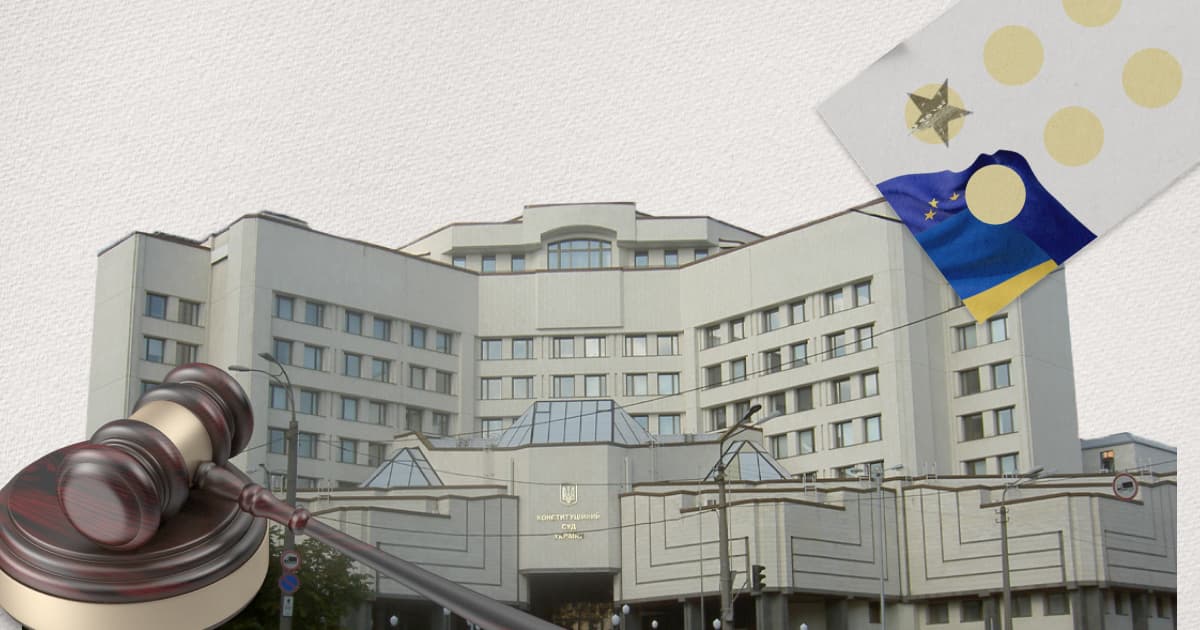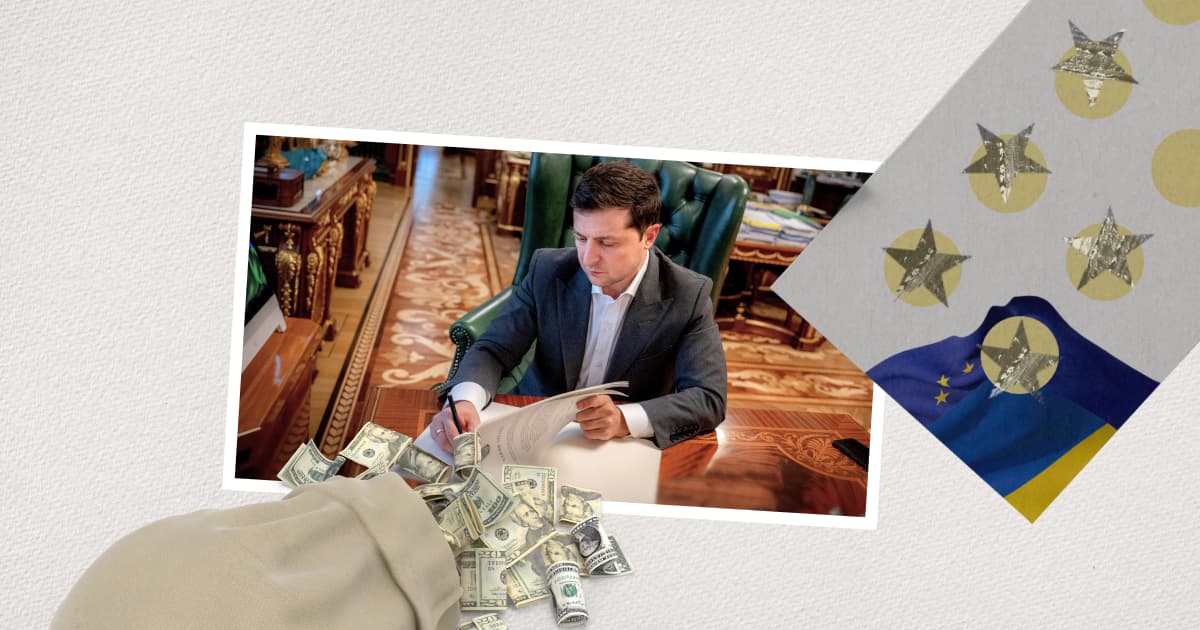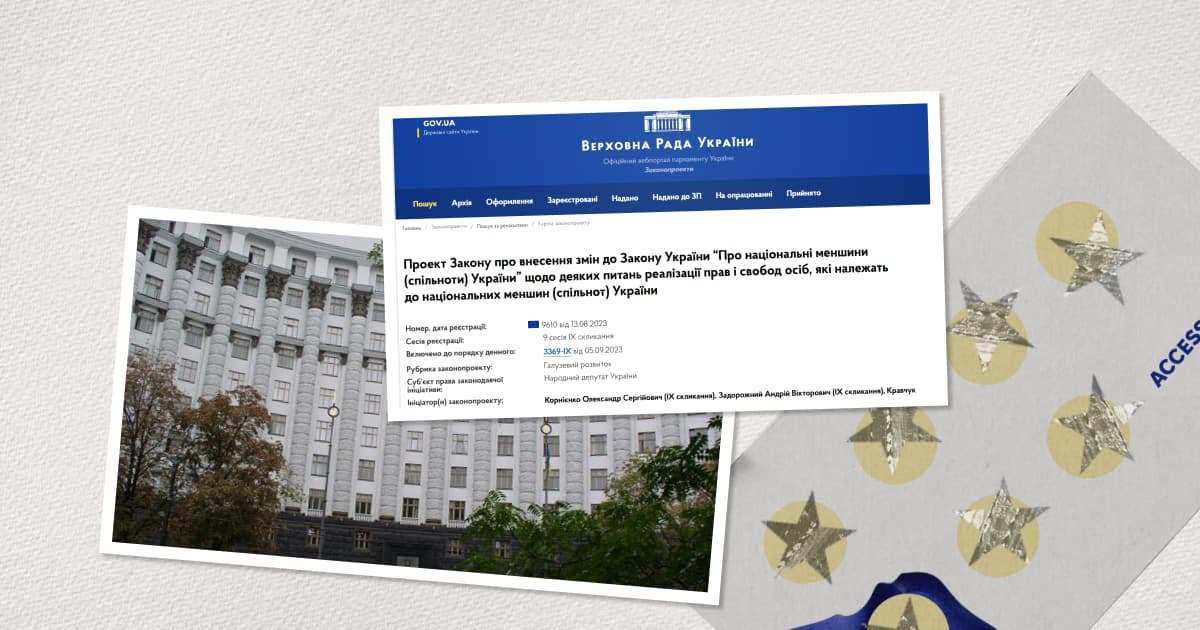Ukraine — EU. How have the recommendations of the European Commission been implemented?

In June 2022, Ukraine was granted the status of a candidate country for accession to the European Union. In addition to the candidate status, Ukraine also received recommendations to be implemented in exchange for beginning negotiations on actual EU membership. These included progress in judicial reform, reforms to laws on media and national minorities, and the fight against corruption and the oligarchy.
On September 26, Prime Minister of Ukraine Denys Shmyhal announced that Ukraine had completed the implementation of seven recommendations of the European Commission at the governmental level.
This article tells how Ukraine has complied with them and when to expect further steps towards EU membership.

1. Selection of the Constitutional Court judges based on the recommendations of the Venice Commission
The law voted for in autumn 2022 provided for six members of the Advisory Group of Experts (AGE) that will select judges of the Constitutional Court: three international and three Ukrainian.
In its report in December 2022, the Venice Commission noted that the number of AGE members should be increased to seven and that candidates who fail to pass the expert selection should not be allowed to judge. International partners should delegate the seventh member to have an advantage over Ukrainians, who benefit from a Constitutional Court loyal to the authorities.
The President's Office suggested keeping six group members and making decisions by a majority vote - four votes out of six. According to the deputy head of the OP, Andrii Smyrnov, MPs had concerns that "the seventh member of the group from internationals would mean excessive interference with the discretion of the subjects of appointment of CCU judges - the president, the Verkhovna Rada and the Congress of Judges".
DEJURE explained that with the inclusion of the seventh member of the commission, experts delegated by international partners would no longer be forced to seek a compromise with appointees from the Ukrainian parliament, president and congress of judges, and Ukrainian members of the commission would not be able to sabotage or block the work of the entire AGE for political reasons.
In addition, the president, the Verkhovna Rada and the Congress of Judges will still appoint the judges of the Constitutional Court. The AGE will only select candidates based on moral qualities and professionalism.
In May 2023, MPs registered a compromise draft law that retains six AGE members, but decisions will be made by a majority vote (four out of six) only if at least two internationals support them. The parliament also considered an amendment according to which if a candidate for a CCU judge received a negative opinion from the AGE, they were excluded from the competition.
In its new report, the Venice Commission regretted that the seventh member of the AGE was omitted. Still, it was generally "satisfied with the constructive position of the Ukrainian authorities" and believed its key recommendations had been followed.
On August 18, the law was signed by Volodymyr Zelenskyy. Denys Shmyhal says Ukraine is working "in constant coordination with the Venice Commission". On September 19, the Council of Judges of Ukraine announced the start of a competition for the positions of CCU judges.
2. Selection of members of the High Council of Justice and the High Qualification Commission of Judges
The High Council of Justice is the main body in charge of regulating judicial activity. The Council makes decisions on the appointment, dismissal and transfer of judges, considers disciplinary cases and gives consent to the detention of a judge, their custody or arrest.
For example, before the former Chief Justice of the Supreme Court of Ukraine, Vsevolod Kniazev, who was arrested in May for accepting a $2.7 million bribe, was taken into custody, the High Council of Justice had to give permission for his arrest.

Even before the outbreak of full-scale war, the High Council of Justice had lost its authority. Most of the members of the former composition resigned after the beginning of the work of the Ethics Council, which checked their integrity. As a result, judges who could not resign continued to work, and new ones could not be appointed without the HCJ.
In January 2023, the Congress of Judges of Ukraine elected eight new members of the HCJ - the Council gained a quorum of 15 out of 21 members and became competent. However, representatives of civil society organisations had doubts about their integrity.
For example, Hryhorii Usyk, the head of the HCJ, underreported the value of his land plots, the cost of building a house and the cost of a car in his declarations. The real estate costs were significantly higher than the judge's income. In 2019-2021, the High Council of Justice received 50 complaints against Usyk. We have previously covered the newly elected members of the Council in a separate article.
Another body that the European Commission demanded to form was the High Qualification Commission of Judges. It selects judges to all courts of Ukraine, except the Constitutional Court, verifies candidates and conducts exams, and then proposes them for appointment to the High Council of Justice.
There are more than two thousand judicial positions in Ukraine — in fact, every third position is vacant because the selection process has been suspended since 2019. Back then, Volodymyr Zelenskyy and the new parliament dismissed the previous High Qualification Commission of Judges members. A new one was not formed due to the resistance of the former members of the High Council of Justice.
On June 1, the High Council of Justice appointed a new composition of the High Qualification Commission of Judges. In September, the Commission announced the largest competition in the history of Ukraine to replace vacant judges: 532 positions in appellate courts and 560 jobs in local courts.
3. Strengthening the fight against corruption, appointing heads of the Specialised Anti-Corruption Prosecutor's Office and the National Anti-Corruption Bureau
The National Anti-Corruption Bureau investigates grand corruption committed by high-ranking public officials. The new NABU director, Semen Kryvonos, was appointed in March 2023. After that, the bureau announced a reorganisation.
The Specialised Anti-Corruption Prosecutor's Office is an independent unit of the Prosecutor General's Office that supports court cases investigated by the NABU. After the previous head of the SAPO, Nazar Kholodnytskyi resigned at his own request, the body worked without a head for almost two years. Former Prosecutor General Iryna Venediktova performed these duties.

In July 2022, Oleksandr Klymenko, who won the competition in December 2021, was appointed head of the SAPO, but the commission cancelled and postponed the official announcement of the results.
The NABU reported that the number of people caught in corruption in the second half of 2022 was a record in anti-corruption agencies' history. One hundred forty-nine people received suspicions from the NABU and the SAPO, which is more than in 2021 or 2020. The economic effect of the agencies' activities during this period was almost UAH 1.9 billion.
In September, the Verkhovna Rada also reintroduced mandatory asset declarations for public officials. Following a petition gathering over 80,000 signatures, the declaration system was reintroduced with open registers.
4. Combating money laundering according to the standards of the Financial Action Task Force (FATF) and adopting a plan to reform the entire law enforcement sector
The FATF Core Forty Recommendations were developed in the 1990s as an initiative to combat the misuse of financial systems. More than 130 countries have endorsed the Recommendations, the international standard in the fight against money laundering. In 2001, the FATF expanded its mandate to include the financing of terrorism.
Back in 2022, Ukraine adopted a law simplifying the procedure for submitting information required for financial monitoring. On September 19, 2023, the Cabinet of Ministers submitted an additional draft law to the Verkhovna Rada to adapt Ukrainian legislation to FATF standards.

The document proposes to include Russia in the national list of countries that do not cooperate in the fight against money laundering and terrorist financing and to prohibit the provision of funds, assets, financial or other related services to sanctioned persons.
Volodymyr Zelenskyy approved the Comprehensive Strategic Plan for Law Enforcement Reform for 2023-2027 in May 2023. The plan applies to the Prosecutor's Office, the Ministry of Internal Affairs, the National Police, the State Border Guard Service, the State Bureau of Investigation, the Bureau of Economic Security, the Security Service of Ukraine and the State Customs Service.
The changes should cover all aspects of their functioning, from training and recruitment to ensuring the system's efficiency in line with international standards.
Currently, the document considers the directions and priorities of reforms but not a specific action plan, laws to be adopted, and bodies responsible for them.
5. Implementation of the anti-oligarchic law, based on the report of the Venice Commission
On November 5, 2021, Volodymyr Zelenskyy signed the Law on Oligarchs, but it still needs to be enacted. The National Security and Defence Council, chaired by the president, would determine who is an "oligarch" and maintain a register. However, this creates risks of abuse against political opponents.

Ukraine can only implement the law once the Venice Commission gives its report. In June 2023, the Commission recommended that the law's implementation be postponed until the war was over.
The Cabinet of Ministers followed the recommendation and postponed the law's entry into force. The Registry of Oligarchs is expected to start functioning and be filled in three months after the termination/liquidation of martial law.
6. Law on media
Ukraine has adopted laws on media and the implementation of EU provisions in national advertising law.
When the European Commission provided an oral report on Ukraine's progress in implementing the recommendations in June 2023, the media clause was assessed as fully implemented.

According to the recommendation, the law should align Ukrainian legislation with the EU Audiovisual Media Services Directive and empower an independent media regulator.
7. Reform of legislation on national minorities in line with the recommendations of the Venice Commission
Denys Shmyhal described that Ukraine had developed the necessary bylaws to implement the new law on national minorities. The Verkhovna Rada adopted the law at the end of 2022 and, on September 21, 2023, voted for the amendments recommended by the Venice Commission.
"The adoption of this law was a significant achievement for our country. The document, in particular, prohibits any discrimination based on ethnic origin while guaranteeing freedom of thought, religion, use of national minority languages, preservation of cultural identity and education in the mother tongue," said Olha Stefanishyna, Vice Prime Minister for European and Euro-Atlantic Integration of Ukraine.

On September 26, the Cabinet of Ministers approved the state programme "Unity in Diversity" until 2034. The programme aims to create sustainable institutional conditions at the national and regional levels to meet the needs and exercise the rights of national minorities and indigenous peoples.
What's next?
In October, Ukraine is due to report on its reform progress.
"We expect to receive a positive assessment as part of the EU Enlargement Package Report. And then there will be a vote of the European Council, which will open the way to negotiations on our country's accession to the EU," Denys Shmyhal said at a government meeting on September 26.
The President of the European Parliament, Roberta Metsola, hopes that negotiations on Ukraine's accession to the EU will begin before Christmas, in December 2023.


